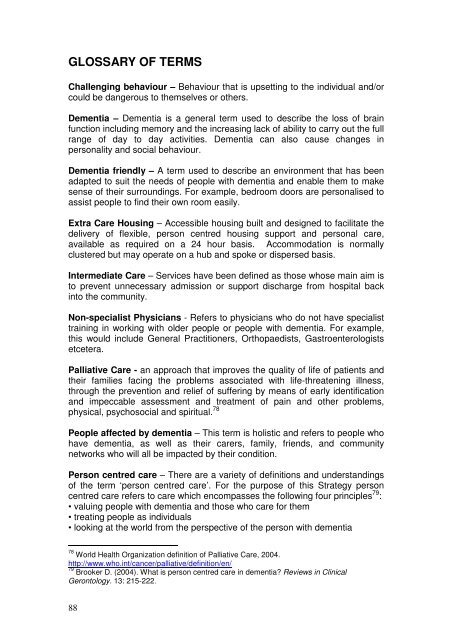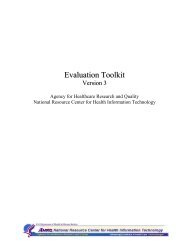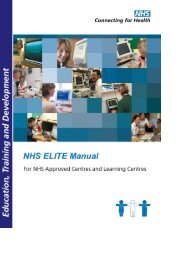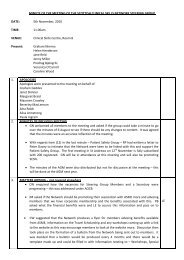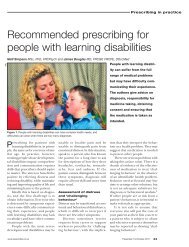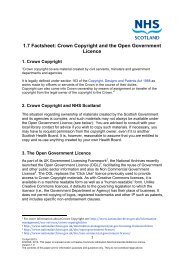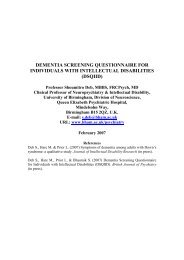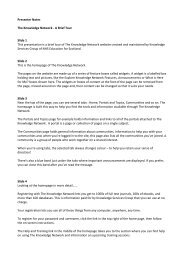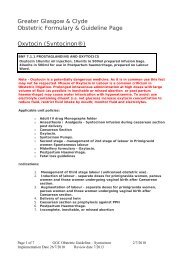The Fife Dementia Strategy: 2010 â 2020 - The Knowledge Network
The Fife Dementia Strategy: 2010 â 2020 - The Knowledge Network
The Fife Dementia Strategy: 2010 â 2020 - The Knowledge Network
You also want an ePaper? Increase the reach of your titles
YUMPU automatically turns print PDFs into web optimized ePapers that Google loves.
GLOSSARY OF TERMS<br />
Challenging behaviour – Behaviour that is upsetting to the individual and/or<br />
could be dangerous to themselves or others.<br />
<strong>Dementia</strong> – <strong>Dementia</strong> is a general term used to describe the loss of brain<br />
function including memory and the increasing lack of ability to carry out the full<br />
range of day to day activities. <strong>Dementia</strong> can also cause changes in<br />
personality and social behaviour.<br />
<strong>Dementia</strong> friendly – A term used to describe an environment that has been<br />
adapted to suit the needs of people with dementia and enable them to make<br />
sense of their surroundings. For example, bedroom doors are personalised to<br />
assist people to find their own room easily.<br />
Extra Care Housing – Accessible housing built and designed to facilitate the<br />
delivery of flexible, person centred housing support and personal care,<br />
available as required on a 24 hour basis. Accommodation is normally<br />
clustered but may operate on a hub and spoke or dispersed basis.<br />
Intermediate Care – Services have been defined as those whose main aim is<br />
to prevent unnecessary admission or support discharge from hospital back<br />
into the community.<br />
Non-specialist Physicians - Refers to physicians who do not have specialist<br />
training in working with older people or people with dementia. For example,<br />
this would include General Practitioners, Orthopaedists, Gastroenterologists<br />
etcetera.<br />
Palliative Care - an approach that improves the quality of life of patients and<br />
their families facing the problems associated with life-threatening illness,<br />
through the prevention and relief of suffering by means of early identification<br />
and impeccable assessment and treatment of pain and other problems,<br />
physical, psychosocial and spiritual. 78<br />
People affected by dementia – This term is holistic and refers to people who<br />
have dementia, as well as their carers, family, friends, and community<br />
networks who will all be impacted by their condition.<br />
Person centred care – <strong>The</strong>re are a variety of definitions and understandings<br />
of the term ‘person centred care’. For the purpose of this <strong>Strategy</strong> person<br />
centred care refers to care which encompasses the following four principles 79 :<br />
• valuing people with dementia and those who care for them<br />
• treating people as individuals<br />
• looking at the world from the perspective of the person with dementia<br />
78 World Health Organization definition of Palliative Care, 2004.<br />
http://www.who.int/cancer/palliative/definition/en/<br />
79 Brooker D. (2004). What is person centred care in dementia? Reviews in Clinical<br />
Gerontology. 13: 215-222.<br />
88


